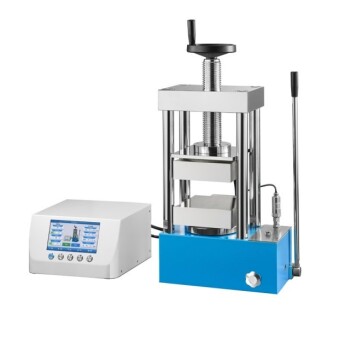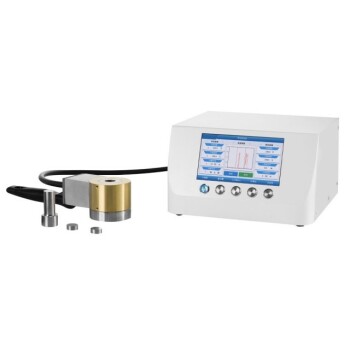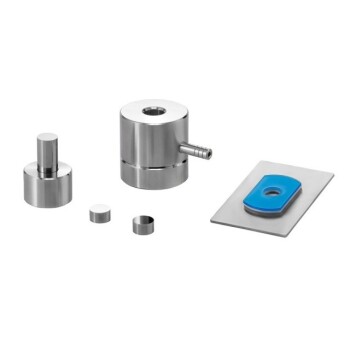In a modern laboratory, a press is the fundamental tool for transforming raw or powdered materials into uniform, testable samples. It serves two primary functions: preparing consistent specimens for analytical tests like spectroscopy (FTIR, XRF) and forming materials into standardized shapes for evaluating physical properties such as tensile strength, elongation, and viscosity.
A test result is only as good as the sample being tested. The core function of a laboratory press is to create uniform and repeatable samples, effectively removing preparation error as a variable and ensuring the integrity of your material analysis.

The Core Principle: Creating Consistency Under Pressure
A laboratory press is designed to do one thing exceptionally well: apply a precise and uniform amount of force to a material contained within a die or mold. This simple function is the key to reliable materials testing.
Eliminating Sample Variability
By compacting loose powders or molding pliable materials under controlled pressure, a press creates a homogenous specimen. This ensures that every part of the sample has a consistent density and form, which is critical for obtaining accurate and reproducible test results.
The Role of Dies and Molds
Materials are placed into a specialized housing called a die set or mold. The press then uses a hydraulic system to apply force, typically ranging from 25 to 75 tons, compressing or shaping the material into a pellet, film, or standardized form factor required for a specific test.
Key Application #1: Sample Preparation for Analytical Chemistry
In analytical chemistry, the clarity of a measurement signal depends entirely on the quality of the sample. Presses are essential for preparing solid samples for various spectroscopic techniques.
Preparing Pellets for Spectroscopy (FTIR & XRF)
For techniques like FTIR (Fourier Transform Infrared Spectroscopy), a powdered sample is often mixed with Potassium Bromide (KBr) and compressed into a small, transparent pellet. This allows the infrared beam to pass through the sample uniformly, producing a clean spectrum.
Similarly, for XRF (X-ray Fluorescence) analysis, powders are pressed into dense, flat pellets to create an ideal surface for X-ray exposure and measurement.
Creating Thin Films for Transmission Analysis
For polymers, a press can be used to heat and flatten the material into a thin, semi-transparent film. This form is perfect for transmission spectroscopy, where light must pass directly through the material to measure its properties.
Key Application #2: Specimens for Mechanical & Physical Testing
For materials scientists and engineers, a press is crucial for creating standardized shapes to measure a material's physical and mechanical behavior.
Molding for Tensile and Elongation Tests
To measure properties like tensile strength and elongation, materials like rubber and polymers must be tested in a standardized shape (often resembling a "dog-bone"). A laboratory press with a heated platen and a custom mold is used to form these perfect, repeatable specimens.
Evaluating Flow and Viscosity
Tests like Mooney viscosity for rubbers or general flow tests for thermoplastics require a properly prepared and conditioned sample. The press ensures the material is in a known state before the test begins, guaranteeing that the results reflect the material's properties, not its preparation.
Understanding the Trade-offs and Limitations
While versatile, a laboratory press is a specific tool with inherent limitations that are important to recognize.
Not a Mass Production Tool
Laboratory presses are optimized for precision, research, and short production runs. They are not designed for the high-volume output of industrial manufacturing, where speed is prioritized over the fine control needed for R&D and quality control.
Dependence on Die Quality
The final sample is only as good as the die or mold used. A worn, damaged, or poorly engineered die will produce inconsistent samples, directly undermining the primary purpose of the press. High-quality, well-maintained dies are critical for success.
Manual vs. Automated Operation
Manual presses are common but can introduce operator variability in how quickly pressure is applied. For applications requiring the highest level of repeatability, automated presses provide programmable control over the entire pressing cycle, but at a significantly higher cost.
Making the Right Choice for Your Goal
The ideal use of a laboratory press depends entirely on your end objective.
- If your primary focus is analytical chemistry (e.g., FTIR, XRF): Your goal is to create a homogenous, uniform sample pellet or film to ensure a clean spectroscopic signal.
- If your primary focus is materials science (e.g., tensile strength, polymers): Your goal is to precisely mold standardized specimen shapes that meet testing protocol requirements.
- If your primary focus is research and development (e.g., pharma, new composites): Your goal is to use the press for rapid prototyping, formulation testing, and small-batch creation.
Ultimately, a laboratory press provides the control needed to transform a raw material into a source of reliable data.
Summary Table:
| Test Type | Key Applications | Industries Benefiting |
|---|---|---|
| Analytical Chemistry | Sample prep for FTIR, XRF spectroscopy | Pharmaceuticals, Environmental, Mining |
| Mechanical Testing | Tensile strength, elongation, viscosity tests | Polymers, Rubber, Composites |
| Physical Property Evaluation | Flow tests, thin film creation | Materials Science, R&D Labs |
Ready to achieve precise and repeatable sample preparation in your lab? KINTEK specializes in high-quality lab press machines, including automatic lab presses, isostatic presses, and heated lab presses, designed to serve your laboratory needs. Enhance your material analysis with reliable equipment that eliminates variability and ensures accurate results. Contact us today to learn how our solutions can boost your efficiency and data integrity!
Visual Guide

Related Products
- Laboratory Hydraulic Press 2T Lab Pellet Press for KBR FTIR
- Automatic Laboratory Hydraulic Press Lab Pellet Press Machine
- Manual Heated Hydraulic Lab Press with Integrated Hot Plates Hydraulic Press Machine
- Laboratory Hydraulic Press Lab Pellet Press Button Battery Press
- Manual Laboratory Hydraulic Press Lab Pellet Press
People Also Ask
- How is a laboratory hydraulic press used for polymer melt crystallization? Achieve Flawless Sample Standardization
- What are some laboratory applications of hydraulic presses? Boost Precision in Sample Prep and Testing
- Why is sample uniformity critical when using a laboratory hydraulic press for humic acid KBr pellets? Achieve FTIR Accuracy
- What role does a high-pressure laboratory hydraulic press play in KBr pellet preparation? Optimize FTIR Accuracy
- How is a laboratory hydraulic press used for Tb(III)-Organic Framework FT-IR samples? Expert Pellet Pressing Guide



















